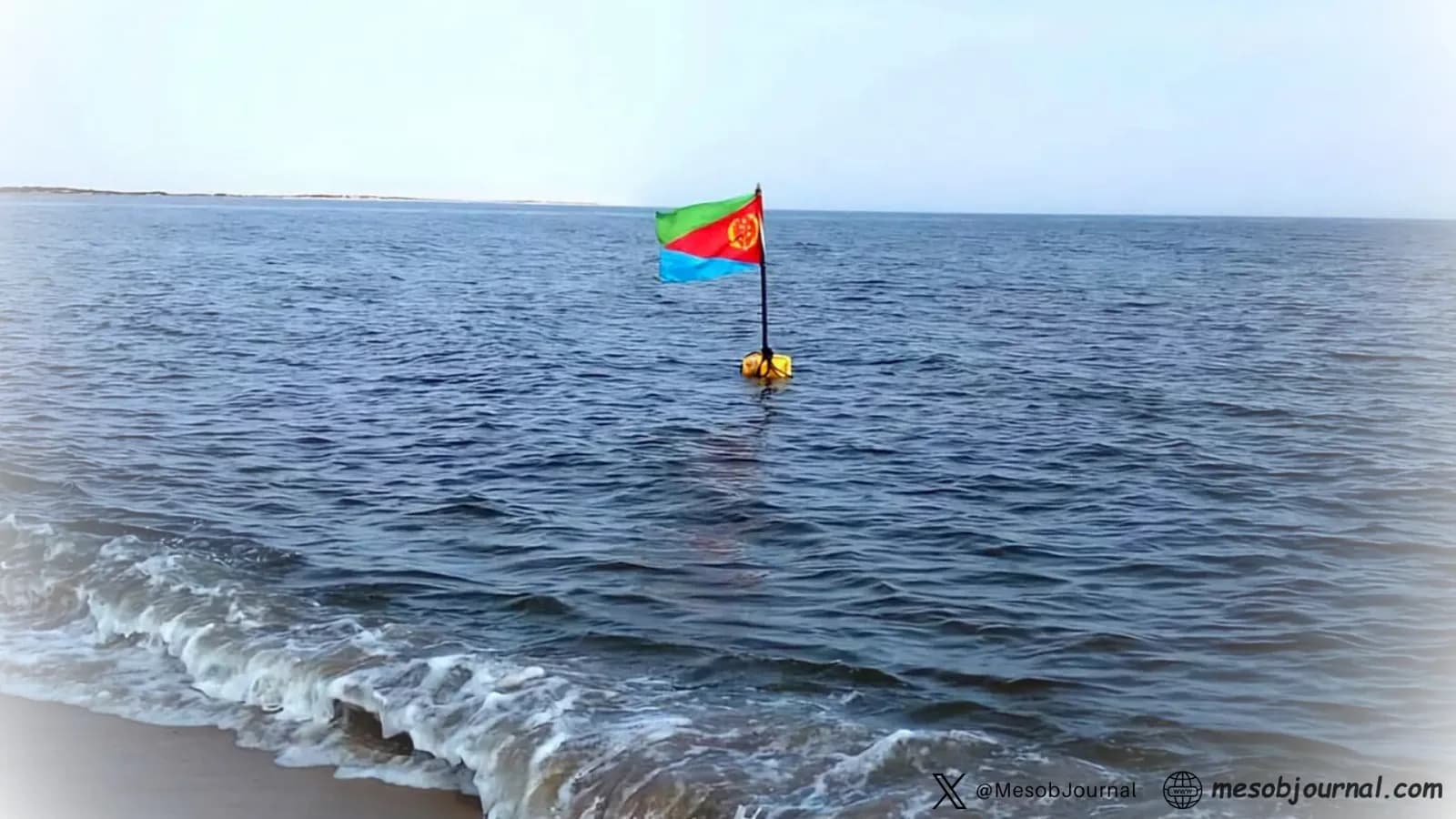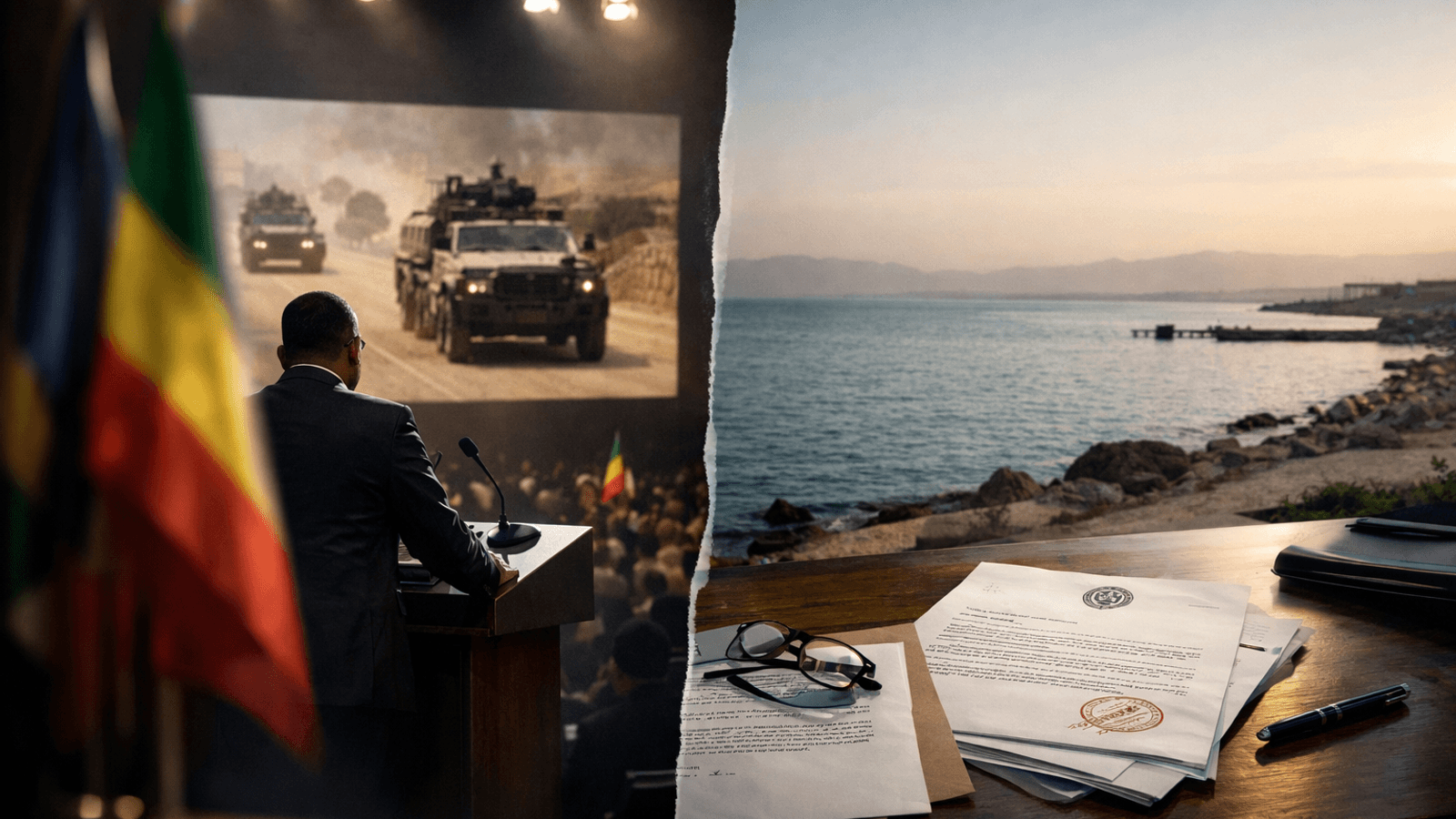The Red Sea Does Not Open to Coercion

Sovereignty — the sacred right of a people to chart their own destiny, guard their lands and waters, and govern themselves — is not lost in a single stroke, nor is it undone in a day.
More often, it is tested, challenged, and chipped away, piece by piece, through strategies that appear small, plausible, and even inevitable. Scholars call this incrementalism: a slow, careful shifting of policies, borders, and norms that masks imperialist ambition behind the veneer of reason.
Incrementalism can quietly rewrite boundaries, creating new status quos before the world even notices. These moves are not abstract — they are insidious.
Ethiopia’s Incremental Strategy
Over the last two years, Ethiopia has deployed this same strategy in a vain attempt to seize the very waves we swam in as children, the ports that anchor our coastal communities, and the coastlines our parents defended with their lives.
Ethiopia’s repeated assertions of a “right” to Eritrea’s Red Sea coastline — sometimes cloaked in threats — are the opening acts of a strategy designed to probe, test, and ultimately undermine our territorial integrity.
Each statement, media narrative, and attempted diplomatic rearrangement with neighboring coastal actors, including the de facto authorities in Somaliland through the January 2024 memorandum, may seem ordinary in isolation. But together, they form a pattern of gradual aggression — a slow attempt to rewrite what is ours and sacred.
Left unchallenged, these incremental moves threaten not only Eritrea’s freedom but also the norms that safeguard the nations surrounding Ethiopia, from the Horn of Africa to the Nile Basin.
Words, Weapons, and Intent
Ethiopia’s strategy has become unmistakable. Senior military and political leaders have publicly described Eritrea’s control of Assab as “banditry,” framing our sovereign ports as illegitimate and denying Ethiopia’s so-called “historical rights.”
Some have even hinted that force could be used to alter the status quo. State-aligned Ethiopian media amplifies this rhetoric, portraying Eritrea’s lawful control of its coastline as a barrier to regional development and positioning Ethiopian ambitions as a corrective measure.
Further, these political and diplomatic maneuvers are accompanied by coordinated military activity. Ethiopian troop movements along the northern frontier have increased markedly, while expansions in the Ethiopian Navy suggest preparation for potential future operations.
The combination of public threats, political statements, media framing, diplomatic agreements, and military positioning forms a pattern of incremental pressure — small, individually plausible actions that collectively threaten Eritrea’s sovereign control over its coastline.
Eritrea Will Not Bend
Let there be no mistake: Eritrea will not bend to pressure. Not an inch. Not a fraction.
For the leaders in Addis, the Red Sea is merely a geostrategic asset — a conduit for trade and a foothold for influence.
For Eritreans, it is so much more than that. Its salt is flavored with our sweat and blood; its shores echo the cries of every Eritrean slain to defend our homeland. The Red Sea you covet is ours by history, sacrifice, blood, and identity. It is quintessentially Eritrean.
Every wave, every grain of sand, every stretch of coastline is a testament to our struggle and our freedom — and we will defend it by every means necessary: through law and diplomacy, with unshakable resolve, and with the same courage that won our independence.
The Path to Cooperation
If Ethiopia seeks access to the Red Sea, it must come as a partner, not a claimant; with respect, not threats.
The sea does not open to coercion — it opens to cooperation grounded in dignity, equality, and friendship between sovereign equals. Eritrea welcomes dialogue, trade, and regional solidarity, but we will never tolerate the language of entitlement or aggression.
Such words are contrary to our ethos as Eritreans and will achieve nothing here.
Understanding Ethiopia’s Struggles
We understand the plight of the Ethiopian people. The most populous landlocked country in the world is under immense strain: a vast and rapidly growing population struggling through deep economic hardship, soaring inflation, and waves of displacement.
Resources are stretched thin, and the urgency for sustainable development has never been greater. Years of inter-ethnic conflict continue to tear at communities and displace millions, while food insecurity grips large swaths of the country, worsened by drought and environmental decline.
In this moment of hardship, Ethiopia’s longing for stable access to the sea is understandable — a desire tied to the survival and well-being of its people.
But threatening Eritrea will not heal its divisions, feed its people, or bring peace to its borders. Coercion cannot substitute for cooperation.
At a time when Ethiopia’s citizens long for stability, its government should seek friendship and negotiate in good faith with its neighbors rather than erode trust through alarming and aggressive statements that destabilize the entire region.
True partnership, not provocation, is Ethiopia’s best path to the Red Sea.
A Call to the Region and the World
We call on our regional partners — Somalia, Sudan, and Egypt, and all nations affected by Ethiopia’s aggressive claims — to stand with Eritrea.
Ethiopia’s coordinated strategy of incremental encroachment is not an isolated incident; it is a pattern that, if left unchecked, threatens the stability of the Horn of Africa.
Together, we must resist these tactics, uphold international law, and safeguard the sovereignty of every nation before further destabilization takes root.
Sovereignty Is Not Negotiable
To the international community and all concerned nations: sovereignty is not negotiable.
The Red Sea — our heritage, our freedom — is indivisible. Eritrea calls on the African Union, IGAD, the United Nations, and all responsible states to recognize and uphold our sovereign rights, to reject coercion in the Horn of Africa, and to support dialogue among equals.
Eritreans — and all friends of Eritrea around the world — must bear witness, speak out, and ensure that our hard-won sacrifices are never dismissed or diminished.
Any attempt to dismantle what we fought for — even incrementally — will meet the same courage, the same pride, and the same unwavering determination that won our independence.
Eritrea Stands
Eritrea stands, sovereign, proud, and unyielding — as it always has, and as it always will.
Related stories

Ethiopia: Abiy's War Script and the Media’s False Balance on Eritrea
The lazy framing is already being warmed up: “tensions are rising,” “neighbours trade claims,” “both sides must de-escalate.” It sounds responsible. It reads balanced. And it quietly deletes the one fact that matters: one side has spent years normalising war talk as policy. If y

Fenkil’s Dawn: The Martyrs Who Made Eritrea Unbowed
Some victories are celebrated once. Others are lived—every day—like a vow you can’t afford to break. At Twalet, the Tanks Don’t Rust In Massawa, the Red Sea air has a way of softening everything—except memory. You can feel it near Twalet, where three tanks stand fixed as a monume

Ethiopia’s MoFA Letter to Eritrea: Another Pretext in Plain Sight
Ethiopia’s Foreign Ministry has sent Eritrea a formal letter dated 7 February 2026 that reads less like a genuine diplomatic outreach and more like a paper trail for escalation. It accuses Eritrea of “occupying Ethiopian territory,” of providing “material assistance” to militan

A Brief Understanding of South Sudan: Not a Forgotten Conflict but a Neglected One
South Sudan, the world's youngest nation, is teetering on the brink of a devastating return to full-scale war. While international attention is often diverted, the country is experiencing a severe political, humanitarian, and security crisis, fuelled by a collapsing peace deal, v

